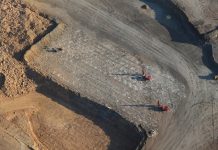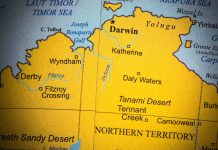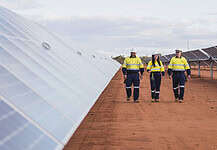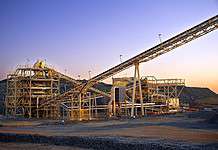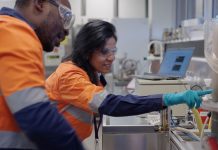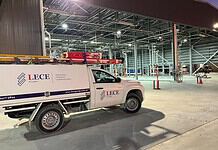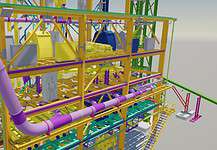The New Acland open cut thermal coal mine.
By Cameron Drummond
NEW Hope Group has acquired an $865m stake in the Bengalla coal mining operation in NSW, as 2016 sees a glimmer of life return to the coal industry.
New Hope Group is an energy company with coal mining business interests and operations at New Acland in QLD and Bengalla in NSW.
The company is ranked as one of the 100 largest ASX-listed companies by its market capitalisation of $1.3 billion, and is amongst the top 10 listed companies based in QLD.
New Hope is a major employer in the state, contributing $300 million per annum to the South East Queensland economy.
Although the coal industry has been challenged through lower prices caused by overcapacity, New Hope managing director Shane Stephan believed demand was steadily growing for high quality Australian coal in Asia.
“In Asia, thermal coal will remain a principal part of the energy mix for the near foreseeable future because coal is cheaper and cleaner than it used to be,” Mr Stephan said.
“The use of new technology with regards to coal utilisation hasn’t been standing still, super-critical coal plants need to use far less coal and therefore produce far less carbon dioxide.
“China has 365 gigawatts (GW) of high efficiency, low emission coal power plants in operation – this is more than six times Australia’s total generation capacity, and another 421GW is under construction or planned.
“Since China’s 2007 adoption of this new clean coal, technology has delivered annual emission reductions of 450 million tonnes of carbon dioxide.”
Bengalla
On 1 March this year New Hope completed its $865m purchase of Rio Tinto’s stake in the Bengalla thermal coal mine in the Upper Hunter Valley region of NSW.
The purchase gave New Hope a 40 per cent share of the mine, which continued to be operated by the Bengalla Mining Company (BMC).
Bengalla’s other joint venture owners are Wesfarmers (40 per cent), with Mitsui and Taipower each holding 10 per cent. The mine currently employs 383 people and an additional 320 contractors.
In 2015 Bengalla produced 8.318 million tonnes of thermal coal. In March that year an extended mining consent was granted for a 15 million tonnes per annum operation through to 2039.
New Hope managing director Shane Stephan said it was a wise decision to buy in to Bengalla, which is one of the three lowest-cost coal mines in Australia.
“The low production costs and very long-dated approvals for the mine permitted to produce up to 15mtpa of thermal coal until 2039 were key factors in [the company’s] decision to buy in to the project,” Mr Stephan said.
New Acland
The New Acland coal deposit sits on the Clarence Moreton Basin in the Darling Downs region of QLD.
The 4.8mtpa open cut thermal coal operation started at in 2002 and currently supports about 275 local jobs and 500 contractor jobs.
A planned extension to the mine, the New Acland Coal Mine Stage 3 Project, was drafted in 2007 to increase production to 10mtpa and extend mine life until 2042.
Enviromental and community impact issues were raised in March 2012, after the QLD Government announced it would not support the project in its current form, forcing a response by New Hope to revise the scope of the project.
The company’s revised proposal included the incremental expansion of the existing New Acland mine to a capacity of 7.5mtpa to extend the mine’s life through the development of two new resource areas – Manning Vale and Willeroo – until 2029.
If the project gained approval, New Hope estimated the project would inject $8 billion into the economy and an influx of newly created jobs would be available at New Acland and the surrounding area.
“During construction Acland Stage 3 would generate approximately an extra 260 jobs during the construction period, and retain 435 local jobs and around 600 contractors after completion.” Mr Stephan said.
The Mining Lease and Environmental Authority process for the project was stalled in the QLD Land Court hearings which commenced on 7 March 2016.
At current production levels, and without approval for further development of the project in the near future, the New Acland coal mine would shut down in 2017.
Quarterly results
Saleable coal production for the latest quarter at New Acland was down 14.3 per cent, negatively impacted by mine sequencing issues; however the company anticipated yields to recover in the September quarter as a greater proportion of raw coal to be processed would come from coal seams lower in the mining sequence.
As a result of New Hope’s 40 per cent interest in the Bengalla thermal coal mine, production and sales volumes still increased compared to prior periods.
Total raw coal production for the first quarter of 2016 was 3.54 million tonnes, up 21.2 per cent quarter-on-quarter.
Total saleable coal production also increased to 1.82mt, up 21.9 per cent compared to the same period last year.
The company currently has a $1.3bn market capitalisation and no debt.
Land Rehabilitation
Established in 2006, New Hope subsidiary Acland Pastoral Company (APC) implemented land rehabilitation programs to return mined land into agricultural and conservation use.
The company said the footprint of each mine pit at New Acland had been no greater than 170 hectares at any one time as it used progressive rehabilitation techniques right behind its mining activities.
“We believe in bringing our rehab right behind us as mining progresses; it’s important from the community and state government point of view that we don’t build up large liabilities of land before rehabilitation,” Mr Stephan said.
Scientific cattle grazing trials; using recycled water for mining activities; and improved works to revegetate wildlife corridors have been conducted by New Hope in efforts to make use of mined land.
“Our practices at New Acland are leading edge and we are very proud of what we do in regards to land rehabilitation,” Mr Stephan said.
On 11 August New Hope was awarded the 2016 ABA100’s Australian Business Award for Sustainability in recognition of its rehabilitation practices and agricultural work.
APC was assisted by researchers at the National Centre for Engineering in Agriculture at the University of Southern Queensland (USQ) for the rehabilitation and scientific cattle-grazing trials.
New Hope has landholdings of about 10,000 hectares on and around the New Acland mining lease, where it runs an estimated 2400 head of cattle and conducts various cropping projects.
APC was in its fourth year of scientific grazing trials at the rehabilitated land.
Measurements showed that, on average, performance from cattle grazing the rehabilitated pastures were comparable or had exceeded the performance of the control (unmined) site.
“It has always been the company’s vision for the land at its New Acland mine to ultimately be returned to a sustainable, profitable agricultural enterprise,” Mr Stephan said.
“The award demonstrates the compatibility of mining and agriculture.”

